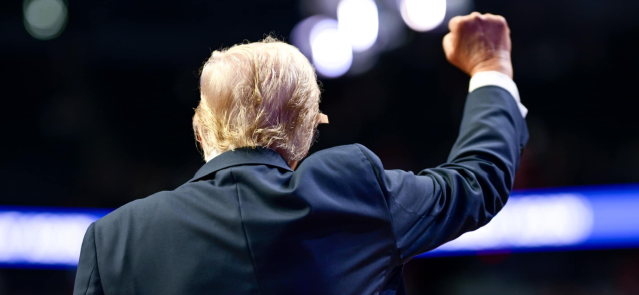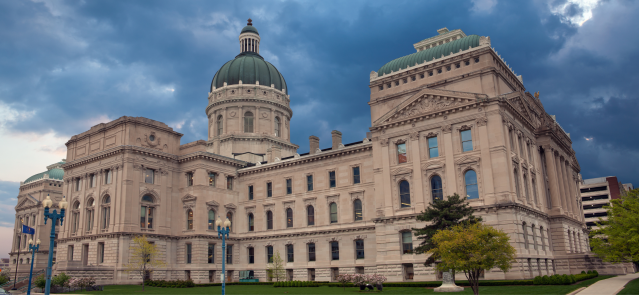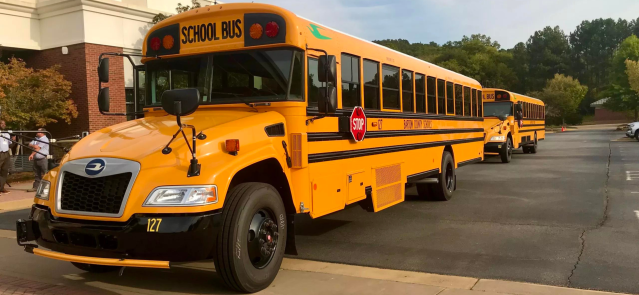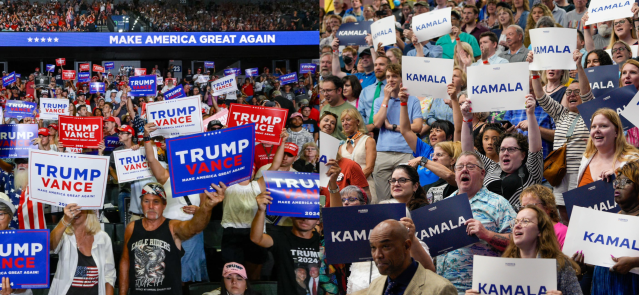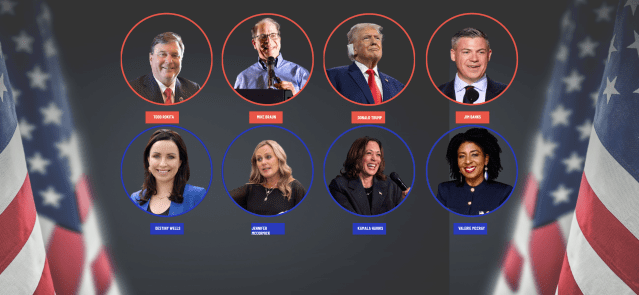Stay ahead of the curve as a political insider with deep policy analysis, daily briefings and policy-shaping tools.
Request a DemoWhy Trump is telling Christians they need to vote ‘just this time’
INDIANAPOLIS — On the face of it, Republican presidential nominee Donald J. Trump continues to say bizarre things at his rallies, but his intent is right there for all to see.
Trump said at The Believers’ Summit on July 26 in Florida: “Christians, get out and vote. Just this time. You won’t have to do it anymore, you know what? Four more years, it’ll be fixed, it’ll be fine, you won’t have to vote anymore, my beautiful Christians.”
Asked to clarify Trump’s intent, campaign spokesman Steven Cheung said in a statement: “President Trump was talking about uniting this country and bringing prosperity to every American, as opposed to the divisive political environment that has sowed so much division and even resulted in an assassination attempt.”
Fox News’ Laura Ingraham on Monday urged Trump to reframe that notion. Instead, he doubled down: “I said, ‘Vote for me; you’re not going to have to do it ever again.’ It’s true.”
“You meant you [they] won’t have to vote for you because you’ll have four years in office,” Ingraham pressed.
“I’m saying, ‘Go out; you must vote,’” Trump replied. “I said to the Christians in the room … ‘You have to vote on Nov. 5. After that, you don’t have to worry about voting anymore. I don’t care because we’re going to fix it. The country will be fixed. … We won’t even need your vote anymore because, frankly, we will have such love.’”
For those who see Trump as an aspiring autocrat, the concern is that if he returns to the White House next January, he will ignore the constitutional term limits that came with the 22nd Amendment.
Section 1 reads: “No person shall be elected to the office of the President more than twice, and no person who has held the office of President, or acted as President, for more than two years of a term to which some other person was elected President shall be elected to the office of the President more than once.”
Trump has often praised autocratic leaders like Russia’s Vladimir Putin and China’s Xi Jinping, both of whom rewrote their constitutions to extend their power. Xi is now “president for life.”
In 2018, President Trump reacted at a closed-door fundraiser in Florida, saying, “He’s now president for life. President for life. And he’s great. And look, he was able to do that. I think it’s great. Maybe we’ll have to give that a shot someday.”
Such rhetoric sends chills down the spines of Americans who value democracy because Trump has acted like an aspiring autocrat repeatedly. He says routinely that elections have been “rigged” and “stolen” with virtually no evidence to back up those assertions. Jan. 6, 2021, is Exhibit A, when he sent a mob of supporters to the U.S. Capitol in an assault aimed at disrupting the decertification process. The attack wounded more than 140 cops and prompted over 1,000 federal criminal charges.
He has since called for the “termination” of the U.S. Constitution and said on Fox News he would only be a “dictator … on day one.” He has threatened to execute Gen. Mark Milley, the former Joint Chiefs of Staff chair, and hold “televised military tribunals” for political opponents ranging from Liz Cheney to former Vice President Mike Pence.
A grinning Republican New Hampshire Gov. Chris Sununu said on ABC’s “This Week”: “I think he’s just trying to make the point that this stuff can be fixed. We want everybody to vote in all elections. But I think he was just trying to make a hyperbolic point that — that it can be fixed as long as he gets back into office and all that. But, you know, classic Trump right there.”
Yep, classic Trump, uttering what we call the quiet parts out loud.
U.S. Sen. Tom Cotton, R-Ark., said on CNN’s “State of the Union”: “I think he’s obviously making a joke about how bad things had been under Joe Biden and how good they’ll be if we send President Trump back to the White House so we can turn the country around.”
That goes beyond joking when taken into context.
U.S. Rep. Ro Khanna, D-Calif., said on X that “whether this was a joke or not, talking about being President for life like Xi Jinping is the most un-American sentiment expressed by an American President. George Washington would roll over in his grave.”
In 2019 at a Republican congressional conference, Trump said of Xi: “He said, ‘But I am not king; I am president.’ I said, ‘No, you’re president for life, and therefore you’re king.’”
Trump is also saying at rallies something completely antithetical for a presidential nominee. He is repeatedly telling supporters he doesn’t need their votes.
“My instruction: We don’t need the votes; I have so many votes,” Trump said on “Fox & Friends” on July 25.
The day after his June presidential debate with Biden, Trump said at a Virginia rally: “We don’t need votes.” A week earlier, he told another GOP conference: “I tell my people, ‘I don’t need any votes. We don’t need the votes.’”
And in Detroit earlier this summer, Trump said, “Listen, we don’t need votes. We don’t need votes. We have to stop — focus, don’t worry about votes.”
What is going on here?
Those remarks appear to be part of a planned Trump campaign assault on the nation’s patchwork of local and state election certification. That could lurch America into a constitutional crisis between the November election and the January 2025 inauguration if several counties refuse to certify results, thus holding up entire states.
The goal here would be to discredit the election by blowing certification deadlines, thus throwing the stalled process to the U.S. House to decide what is called a “contingent election.” That has occurred three times, in 1801, 1825 and 1837.
“Certification is kind of a new Wild West of election work,” Stephanie Jackson Ali, the policy director for voting rights group New Georgia Project, told CNN. “If you can hold up certification, then it really brings into question, can the state certify as a whole? And that means, can we send our delegates for president?”
Republicans on Washoe County’s Board of Commissioners in Nevada refused to certify local election results, as did Republicans on a board of canvassers in Delta County, Michigan, CNN reported.
The Associated Press reported in June: “The past four years have been filled with battles over all sorts of election arcana, including one that had long been regarded as an administrative afterthought — little-known state and local boards certifying the results. With the presidential election looming in November, attorneys are gearing up for yet more fights over election certification, especially in the swing states where the victory margins are expected to be tight. Even if those efforts ultimately fail, election officials worry they’ll become a vehicle for promoting bogus election claims.”
We should never forget the images of the U.S. Capitol under assault in an attempted coup d’état in the face of clear popular vote and Electoral College results.
The sequel is being planned and staged right before our eyes and ears, right now.
Brian A. Howey is senior writer and columnist for Howey Politics Indiana/State Affairs. Find Howey on Facebook and X @hwypol.
Five things to watch in Thursday’s primaries in Tennessee
After months of stump speeches, thousands of door knocks and millions of dollars spent on puffery, mail, digital ads and messaging, Tennessee’s 2024 primary election staggers to a close Thursday as state voters head to the polls.
Here are five things to watch:
1. Voucher referendum?
In many respects, this is the school choice election primary for Republican legislative candidates. It officially became so in the spring when frustrated Republican Gov. Bill Lee, stymied yet again by some Republicans’ resistance to passing a statewide school choice bill, announced he was endorsing three candidates running in open seats.
One is Jason Emert, a Maryville attorney and businessman who made previous unsuccessful bids for Congress and the state House in Knoxville, in state House District 20 seat in Blount County. Emert faces Tom Stinnett, a Blount County commissioner and retired Maryville city schools teacher and popular football coach as well as Nick Bright, the commission’s vice chair. The seat is now is being vacated by Republican Bryan Richey, a Florida transplant. Richey technically is running in Senate District 2 but he basically abandoned all hope after angering the voucher and school choice crowd by refusing to vote in favor of this year’s voucher bill.
Lee also gave his blessing to Aron Maberry, a pro-voucher pastor running in the open House District 68 primary being vacated by retiring Rep. Curtis Johnson in Montgomery County. Lee also endorsed Lee Reeves, an attorney and investor from Franklin running for the House District 65 seat in Williamson County being vacated by moderate Republican Sam Whitson of Franklin. Also in the GOP mix are Williamson County Commissioner Chair Brian Beathard, a Whitson ally, and firebrand Michelle Foreman, a registered nurse and former state GOP executive committee member who ran unsuccessfully two years ago for a Nashville seat won by Democrat Caleb Hemmer.
Lee has also traveled the state to support incumbents who back his voucher position, including Reps. Chris Todd of Jackson, Rusty Grills of Newbern, Scott Cepicky of Culeoka, and John Ragan of Oak Ridge.
2. Outside money
Multiple deep-pocketed voucher and other school choice groups have jumped into contests, often following Lee’s cues. The School Freedom Fund, which is tied to the national Club for Growth, boasted it would spend $3.6 million. It was about $500,000 short of that goal as of the final disclosures before the election.
The group has also waded into state Senate contests, attacking voucher skeptic Bryan Richey in his bid for the open Senate District 2 seat and hammering longtime Sen. Frank Niceley of Strawberry Plains in District 8 over his opposition to vouchers. The group is backing Niceley challenger Jessie Seal, who refused to tell The Tennessee Journal publicly where he stood on vouchers or other school choice avenue.
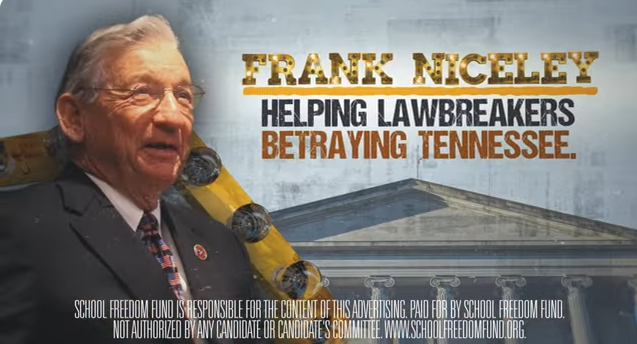
The Tennessee Lookout reported Wednesday that school choice groups have dumped $4.5 million and counting into contests, occasionally at cross-purposes with each another.
3. Federal races
Four years ago, Democrats’ hope of having at least a semi-viable candidate crashed and burned after Memphis environmental activist Marquita Bradshaw, who spent virtually nothing in the primary, unexpectedly won the party’s nomination after the anointed favorite was preoccupied with accumulating cash for the general election.
This year, state Rep. Gloria Johnson — she of “Tennessee Three” fame — has taken no chances. Bradshaw’s again on the ballot — and with a low budget has traveled across the state. Two other candidates are also running. Will Johnson’s effort make any difference in securing the nomination? Regardless, the winner goes up against well-funded incumbent Republican U.S. Sen. Marsha Blackburn in a state where Democrats haven’t won a Senate general election contest since 1990.
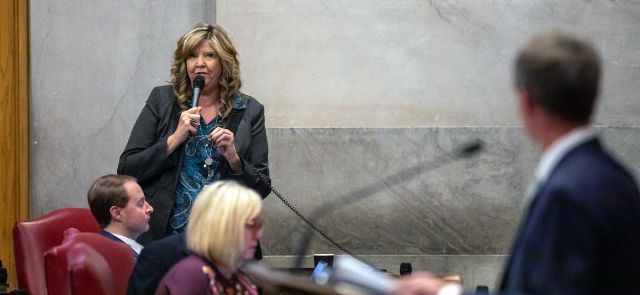
The only real primary battle for U.S. House seats pits freshman Rep. Andy Ogles of Culleoka against Nashville Councilwoman Courtney Johnston, who has lapped the incumbent on the fundraising front and benefited from heavy independent expenditures by a group called Conservatives with Character. Ogles, a former director of the state chapter of Americans for Prosperity, is counting on the group for outside ads and on-the-street campaigning.
4. The power of incumbency
At least three Republican members in the Senate — Jon Lundberg of Bristol, Ferrell Haile of Gallatin and Frank Niceley of Strawberry Plains — are hoping to avoid becoming the state’s first upper chamber GOP member in 10 years to be primaried.
The most recent such unseatings occurred in 2014, when Knoxville physician Richard Briggs defeated Sen. Stacey Campfield and accountant Kerry Roberts of Springfield beat Sen. Jim Summerville. Before that, then-Rep. Doug Overbey toppled Sen. Raymond Finney in 2008. The latter had done the same four years earlier to his predecessor, Republican Sen. Bill Clabough, who had voted for an income tax and against a proposed constitutional amendment to remove protections for abortions.

There is a more recent example of a Senate Democrat losing a primary challenge. In 2018, Katrina Robinson ousted Sen. Reginald Tate, who had long outraged members of his party because of his cozy relationship with the chamber’s Republican leadership.
The last time a sitting member of the Tennessee congressional delegation lost a primary was when freshman U.S. Rep. David Davis of Johnson City lost to Phil Roe in 2008. Before that, it had been half a century since a member lost a primary. In 2014, freshman U.S. Rep. Scott DesJarlais faced a challenge from then-State Sen. Jim Tracy following revelations that the incumbent had once urged a mistress to get an abortion and sat outside his former wife’s bedroom dry-firing a gun into his mouth. DesJarlais still won by 38 votes.
5. Who’s up?
Here is who is running in open seats (retiring incumbents listed in parenthesis):
- Senate District 2 (Sen. Art Swann): Republican Rep. Bryan Richey and longtime Blount County clerk of courts and hotelier John Pullias.
- House District 4 (Rep. John Hoslclaw): Republican tomato farmer Renea Jones of Unicoi County and longtime Elizabethton Mayor Curt Alexander.
- House District 12 (Rep. Dale Carr): Republican Sevier County Commissioner Fred Atchley, conservative activist Larry Linton and Milligan University student Christian Brown.
- House 20 (Rep. Bryan Richey): Republican Blount County Commissioners Nick Bright and Tom Stinnett and former congressional candidate Jason Emert.
- House District 60 (Rep. Darren Jernigan): Democratic gun control advocate Shaundelle Brooks, financial consultant Tyler Brasher and disabled veteran John Parrish. The Republican contest features Chad Bobo, a former aide to House Speaker Cameron Sexton, and Christopher Huff.
- House District 65 (Rep. Sam Whitson): Republican attorney Lee Reeves, Williamson County Commission Chair Brian Beathard and attorney Michelle Foreman.
- House District 68 (Rep. Curtis Johnson): Republican pastor Aron Maberry, travel planner Carol Duffin, Montgomery County Commissioner Joe Smith, and retired Army aviator Greg Gilman.
- House District 96 (Dwayne Thompson): Democrats Gabby Salinas, Eric Dunn, Telisa Franklin, Orrden Williams Jr. and David Winston.
A number of incumbents face challenges in their primaries as well:
- Senate District 4: Republican Sen. Jon Lundberg of Bristol versus pharmacist Bobby Harshbarger, the son of U.S. Rep. Diana Harshbarger.
- Senate District 6: Republican Sen. Becky Massey of Knoxville versus Monica Irvine, who runs the Etiquette Factory.
- Senate District 8: Republican Sen. Frank Niceley of Strawberry Plains against New Tazewell businessman Jessie Seal.
- Senate District 10: Republican Sen. Todd Gargenhire versus former Red Bank city commissioner Ed LeCompte.
- Senate District 12: Republican Sen. Ken Yager of Kingston versus conservative activist Teena Hedrick
- Senate District 18: Republican Sen. Ferrell Haile versus conservative activist Chris Spencer. Both are from Gallatin.
- Senate District 24: Republican Sen. John Stevens versus Charlie Cooper, a budget administrator and spokesman for the Benton County mayor’s office.
- Senate District 30: Democratic Sen. Sara Kyle versus Erika Stotts Pearson of Memphis.
- House District 13: Republican Rep. Robert Stevens of Smyrna versus Murfreesboro City Council member Jami Averwater.
- House District 15: Democratic Rep. Sam McKenzie versus Knox County Commissioner Dasha Lundy.
- House District 24: Republican Rep. Kevin Raper of Cleveland versus Troy Weathers in a repeat of their 2022 race.
- House District 27: Republican Rep. Patsy Hazlewood versus businesswoman Michele Reneau.
- House District 28: Democratic Rep. Yusuf Hakeem versus Chattanooga City Council member Demetrus Coonrod.
- House District 31: Republican Rep. Ron Travis versus Richard W. Smith.
- House District 33: Republican Rep. John Ragan of Oak Ridge versus former Clinton police chief Rick Scarbrough.
- House District 34: Republican Rep. Tim Rudd versus public relations consultant Tucker Marcum.
- House District 43: Republican Rep. Paul Sherrell of Sparta versus businessman and White County Commissioner Robert McCormick.
- House District 56: Democratic Rep. Bob Freeman versus Vanderbilt University student Nick Forster-Benson.
- House District 64: Republican Rep. Scott Cepicky versus Maury County Commissioner Ray Jeter.
- House District 69: Republican Rep. Jody Barrett versus former Hickman County Commissioner Ronny George.
- House District 73: Republican Rep. Chris Todd versus former Madison County Mayor Jimmy Harris.
- House District 77: Republican Rep. Rusty Grills versus Dyer County Commissioner Bubba Cobb.
- House District 78: Republican Rep. Mary Littleton versus teacher Justin Spurlock.
- House District 80: Democratic Rep. Johnny Shaw versus Shelia Godwin and Jonathan Joy.
- House District 96: Democratic Rep. Justin Pearson versus David Page.
- House District 97: Republican Rep. John Gillespie versus cleaning business owner Christina Oppenhuizen.
Editor’s note: This story has been updated to correct that Richard Briggs and Kerry Roberts were the most recent candidates to defeat Senate incumbents in Republican primaries in 2014.
Closeout day brings slower Indiana growth
WEST LAFAYETTE, Ind. — Closeout day in the Indiana Statehouse is near and dear to the number crunchers among us. That’s the day the state comptroller and the State Budget Agency tell us about revenues, expenditures and balances for the just-ended fiscal year. The 2024 closeout came on Tuesday, July 23, about a week later than usual because of some convention happening in Milwaukee. You can find the closeout documents on the Budget Agency’s website.
In fiscal 2024, revenues were 1.4% higher than in 2023. That’s much slower growth than the 9.3% annual average from the past three years. That rapid growth was due to federal pandemic aid to taxpayers and governments, and that’s over.
Individual income tax revenue grew 6.9%, which makes sense in a growing economy.
But sales tax revenues fell 0.9%, which doesn’t make so much sense with consumers spending more and inflation at 3%. One reason: The closeout reports general fund sales tax revenue, and we’ve been moving sales taxes on gasoline from the general fund to highway maintenance funds. Another reason: In Indiana most goods are sales taxable; most services are not. Consumers switched their spending from services to goods during the pandemic, and now they’re switching back. They’re spending more on untaxed services.
Corporate income tax revenue fell by 21.6% in 2024. Corporate taxes are especially unstable, which is just a way of saying, “Who knows why?” Indiana manufacturing employment has been falling since mid-2022, though, and Indiana is a manufacturing state. Perhaps the corporations doing business here have been less successful lately. The decline in corporate taxes was more than offset by the rise in interest earnings on state balances. They nearly doubled as a result of higher interest rates.
Another way to look at revenues is in comparison to what we thought we’d get when the 2024 budget was passed. The current two-year spending plan was passed in the 2023 session of the General Assembly, based on a forecast of revenues for 2024 and 2025. Back then we thought we’d raise $21.9 billion in 2024. According to the closeout, we actually got $21.5 billion. Revenues fell short by $369 million.
We knew that was coming. Revenue forecasts are revised every December, and seven months ago expected revenues for 2024 were cut by $355 million. The closeout showed that the December forecast was off by only one-tenth of 1%. There were no new shortfalls in the closeout.
The worst news last December, though, was a $1 billion increase in estimated Medicaid spending. Medicaid is an entitlement program, so spending depends on how many people qualify for care and how much that care costs. Future service demand and costs have to be estimated, and the original budget estimates were too low.
That problem shows up in a closeout document called “General Fund Combined Statement of Estimated Unappropriated Reserve.” Or, more concisely, state balances. Balances are money that has been collected in taxes but are not scheduled to be spent. They are invested to earn interest revenue.
About halfway down the document is a category called “Augmentations.” That’s spending not anticipated when the budget was passed. The footnote lists “Estimated Medicaid shortfall” at $255 million for 2024 and $458 million for 2025. That’s $713 million in total, which is less than $1 billion but still a big hit on the budget. The state is looking for ways to save money while continuing to provide needed care.
The legislature passed a spending plan for 2024, but revenues fell short and costs were unexpectedly high. That could be a big problem, except the state began the fiscal year with $2.9 billion in balances. One reason to keep balances is to maintain budgeted spending in the face of forecast errors. Total balances at the end of fiscal 2024 were down to $2.55 billion. That’s still 11.6% of the budget, in the middle of what’s sometimes called the “prudent range” of 10% to 12.5%.
Balances are expected to fall again in 2025, to $2.3 billion, which is 10.6% of the budget. Still prudent but a little closer to that lower limit. That will be on the minds of legislators when they debate the 2026-27 budget starting in January.
Larry Deboer is a professor of agricultural economics at Purdue University.
New Georgia laws affecting this year’s back-to-school season
It’s back-to-school season in the Peach State, and things are bound to look somewhat different both inside and outside the classroom.
As you grapple with school supply shopping, figure out bus routes and try to get back into the routine of school, it’s also worth taking a look at the new education laws that went into effect this summer.
State Affairs has compiled a rundown of recent legislation that could mean major changes for students, parents and educators.
Inside the classroom
Senate Bill 395 requires public schools to make a “reasonable effort” to stock an opioid antidote to treat overdoses related to substances such as fentanyl. This act was passed following an incident in May at Dunwoody High School, where a student suffered acute fentanyl intoxication and later died.
Fentanyl-related deaths have become a major issue across Georgia, with fentanyl-involved overdose deaths increasing by 800% among adolescents in 2021, according to the Georgia Department of Public Health.
To further invest in students’ health, House Bill 874 requires Georgia public schools to carry an automatic external defibrillator to use in cases of cardiac arrest.
Georgia’s recent legislation will also bring major changes for school employees.
Continue reading “New Georgia laws affecting this year’s back-to-school season”A new presidential choice
SOUTH BEND, Ind. — All those dissatisfied voters complaining about a terrible presidential choice between two old guys — one too frail, the other too unhinged, both with high disapproval ratings — now have a different choice.
Actually, in deciding the direction of the country, it’s the same choice.
Former President Donald Trump is now the one with the age issue as he rambles on in disjointed speeches, repeating jokes about cannibalism and misstating statistics and history. He has become the oldest presidential nominee in U.S. history. He would be 82 by the end of his term if he wins in November.
But there is no mystery about the course Trump would follow on issues at home and abroad.
President Joe Biden, now 81, no longer seeks reelection after his shocking performance in the June 27 debate, when he couldn’t complete sentences or thoughts and convinced many voters that he couldn’t complete another term. He is being replaced as the presidential nominee by Vice President Kamala Harris, younger and more articulate. She is 59, finally a candidate where age is no factor.
But there is no mystery about the course Harris would follow on issues at home and abroad. It’s the same course Biden would take.
So if each side is adamant about following its long-proclaimed course and rejecting what the other side would do, what’s the big deal about Harris replacing Biden?
It’s a big deal because this election is so consequential, with voters deciding between sharp differences on abortion, immigration and taxation at home and what to do in the world on Ukraine, NATO and climate change. A lot more as well.
And the change in nominees could have an effect with voters, maybe not much, but not much is needed to be decisive in a close vote in key states.
Biden, never recovering politically from that disastrous debate, appeared to be headed for defeat, with Trump returning to the White House, perhaps with Republican control of both the Senate and the House. Although Biden wanted to take on and defeat Trump, as he did before, he realized the dire situation and stepped aside, endorsing Harris.
Harris has had an immediate effect, energizing many Democrats who had grown despondent. She turned fundraising from dismal to robust and sparked voter registration.
However, that also could increase efforts of a Trump campaign that had grown overconfident — didn’t bother to pick a vice presidential nominee from a swing state or one fully vetted.
Also, Trump won’t lose his MAGA base no matter what. The election will be close. Trump still appears to hold at least a slight advantage in the Electoral College, where the race is decided.
The biggest effect could be with those disgruntled voters who had been so displeased with the Trump vs. Biden choice, the old choice once again. Because of their dislike for both of those candidates, those voters have been described as “double haters,” so dissatisfied that they were threatening not to vote or to throw away their votes to some third-party candidate.
Will some of them now decide to vote for the replacement for one of the “old guys,” or will Harris also be regarded as unworthy because of something not involving the crucial issues: her gender, her racial diversity or her laugh?
Before Biden bowed out, a lot of those “double haters” were unwilling to look beyond the candidates and make a choice based on the issues, on the direction of the country.
With a new choice of candidates, will those dissatisfied voters now look more at the significant issues and take a stand on the direction for this nation’s future? And if so, which direction will most of them choose?
The choice of candidates has changed. In determining the direction of the country, it’s the same choice.
Jack Colwell has covered Indiana politics for over five decades for the South Bend Tribune. Email him at [email protected].
Kansas Daily News Wire August 1, 2024
Welcome to the Kansas Daily News Wire, your daily roundup of top state and political stories from newsrooms across Kansas. — Hawver’s Capitol Report/State Affairs
Legislative Coordinating Council renews contract with KanFocus, wants bids for servicer to track 50 states: The Legislative Coordinating Council on Tuesday renewed its bill tracking services contract with KanFocus but also authorized a subcommittee to kick-start a process to solicit bids for providers with the ability to track legislation in all 50 states. (Resnick, State Affairs)
Kansas stops enforcing a law against impersonating election officials: Kansas is no longer enforcing a 3-year-old law making it a felony to impersonate election officials as it faces a legal challenge from critics who argue that the law has hindered efforts to register new voters. (Associated Press)
Former DHS secretary: Entities can never be certain of cyberattack security: Even if a private company or a government agency is “miles ahead,” they can never guarantee complete safety from a cyberattack, according to former Homeland Security Secretary Jeh Johnson. (Richardson, State Affairs)
Summit Truck Bodies invests $50M in 2nd Wathena plant: Summit Truck Bodies will invest $50 million to build a new plant in Wathena and double the company’s output. (Richardson, State Affairs)
Video shows dramatic rescue of crying Kansas toddler from bottom of narrow, 10-foot hole: Some quick thinking by a police officer in central Kansas saved a 14-month-old boy from the bottom of a narrow pipe in a dramatic rescue that was captured on camera. (USA Today)
Hays native photographs Simone Biles at Olympics: The artistry and grit coming from athletes competing in Paris is being captured by a Kansas photographer. (KSN)
Trial date set in discrimination suit by 3 female Topeka police administrators: A federal judge on Friday scheduled the jury trial to begin at 9 a.m. Sept. 16 in a lawsuit Topeka police administrators Colleen Stuart, Jana Kizzar and Jennifer Cross are pursuing against the city and former police chief Bryan Wheeles. (Topeka Capital-Journal)
Watkins Museum exhibition features items from Olympians of Lawrence and Douglas County: Artifacts and photographs from local Olympic participants, including Billy Mills and Phog Allen, are now on display at the Watkins Museum of History. (Lawrence Times)
Wellington High School joins other schools in banning cellphone use in its classrooms: As technology becomes more prevalent, it’s important to address cell phone use in classrooms. That’s what Wellington High School is doing with its new cell phone policy. (KAKE)
Legislation formally designates Kansas City VA outpatient clinic to be named after Kansas veteran: New federal legislation has been signed into law that will formally designate a VA outpatient clinic in Kansas City, Kan., to be named after a native Kansas veteran. (WIBW)
Will Kamala Harris lead a movement of women voters?
It was early afternoon on Sunday, July 21, when Stacie Grant heard screams erupting from a nearby conference room at the Indiana Convention Center.
“It was the tweet that went out from the president’s office that he was no longer going to pursue being the nominee,” said Grant, the 26th international president of Zeta Phi Beta, who was working on logistics for the sorority’s 2024 Grand Boulé conference under the theme “Amplifying Women: The Extraordinary Power of She.”
The “president’s office” in this case was that of Democrat Joe Biden, who, after three weeks of pressure following his disastrous June debate with Republican presidential nominee Donald J. Trump, had decided to end his reelection bid.
“Everybody said, ‘Wait, what does that mean?’” Grant said. “Nobody knew what was coming next.”
What came next was a sitting vice president who in those three days had effectively sewn up the Democratic presidential nomination and was due to speak to Zeta Phi Beta, one of the “Divine Nine” historically Black sororities and fraternities, at the Grand Boulé on Wednesday, July 24.
This thunderclap news came 104 years after Zeta Phi Beta was founded at Howard University a few blocks from the White House. That was in January 1920. In August of that year, when Tennessee became the final state to give its approval, the 19th Amendment was passed, granting American women the right to vote.
“The right of citizens of the United States to vote shall not be denied or abridged by the United States or by any State on account of sex,” the 19th Amendment read. It took nearly a century for the suffragette movement to reach its holy grail. And on Nov. 2, 1920, over 8 million American women voted in elections for the first time.
Now, more than a century later, potentially the most consequential presidential election for women will take place this November. The same question Grant posed on July 26 on a WFIU-FM “Noon Edition” broadcast is still operative today: What comes next?
This election process comes with Kamala Harris poised to be the second woman to win a presidential nomination (Hillary Clinton was the first in 2016, losing to Donald Trump).
It will also be the first presidential and Indiana gubernatorial election since the U.S. Supreme Court’s Dobbs v. Jackson Women’s Health Organization decision that essentially ended the 50-year Roe v. Wade era of abortion access. The ruling withdrew a reproductive “right,” the first time that has occurred in the American experience, tossing the issue back to the states.
And it will be the first Indiana gubernatorial election since Dobbs, with the tickets at polar opposite ends on the gender diversity scale, coming two years after Gov. Eric Holcomb signed one of the nation’s most restrictive abortion bills a little over a month after the Supreme Court decision.
The Republican ticket features Trump, vice presidential nominee JD Vance, Mike Braun for governor, Micah Beckwith for lieutenant governor, Todd Rokita for attorney general and Jim Banks for U.S. Senate.
Hoosier voters will find a Democratic ticket headed by Harris, Jennifer McCormick for governor, Terry Goodin for lieutenant governor, Destiny Wells for attorney general, and Valerie McCray for U.S. Senate. Harris is expected to name a running mate by Aug. 7.
Those 8 million female voters in 1920 were just a fraction of those eligible in a presidential election where 27 million participated (with Republican Warren Harding defeating James Cox in an election that featured two future presidents running as vice presidents: Calvin Coolidge and Franklin D. Roosevelt). The real impact of this new voting bloc, the thinking went, would occur in 1924.
Except it didn’t.
Historian Christine Stansell said the 19th Amendment was the “single greatest act of mass enfranchisement” in American history. Yet the 1920 watershed is problematic, Stansell told WomensHistory.org.
“One, it did not enable Black women to vote in the South. It would take several decades before Black women specifically, and women of color generally, would achieve full voting rights in the United States. Two, it did not drastically increase the number of women voters in elections. Finally, it did not create a ‘gender gap’ capable of significantly influencing American elections,” Stansell said.
“Our estimates of women’s turnout immediately after suffrage suggest that women’s turnout initially lagged men’s by a wide margin,” Christina Wolbrecht, a political science professor at University of Notre Dame, and J. Kevin Corder, a political science professor at Western Michigan University, wrote in their book “Counting Women’s Ballots.” “While the gap slowly closed, even by 1936, nearly 20 years after ratification, women’s turnout was still about 20 percentage points behind men.
“Dominant narratives after suffrage, in popular and academic conversation, put the blame for women’s lower turnout squarely on the shoulders of women themselves,” the authors continued. “As early as 1924, headlines from Good Housekeeping (‘Is Women’s Suffrage a Failure?’) to Harper’s (‘Are Women a Failure in Politics?’) and beyond declared women’s suffrage a failure because women chose not to vote (and when they did, voted like their husbands).”
There was also a huge complicating factor in 1924: the Ku Klux Klan election in Indiana and several other northern states. With the rapid rise of Grand Dragon D.C. Stephenson, the KKK took over the Indiana Republican Party in 1924. It elected dozens of KKK members to General Assembly GOP majorities as well as the Klan Gov. Ed Jackson. It dominated county commissions, county courthouses, city halls, police and sheriffs’ departments.
In a WFIU-FM “Noon Edition” broadcast hosted by Laurie McRobbie and Bob Zaltsberg on July 26, State Affairs asked Grant whether her organization began with the mantra of the right to vote. And how did that evolve?
“We know in the 1920s there was an interesting time for the entire country,” Grant said. “When you think about African Americans and their entire experience in their ability to go to colleges and universities, it wasn’t as widespread as it is now. So the mere fact that Howard University was one of the few places they could go to get an education, they realized that finding some community to help you sustain your process through matriculating from school was essential.
“And challenging the scholastic endeavors of members was something they were focused on. And then realizing, how do I reach back and give back and stand on the front lines of women seeking rights, the right to vote being one of them?” she continued. “How do women educate themselves? That was a paradigm shift. Our founders were on the cutting edge of speaking out about how things weren’t normal at the time and advocating that everyone should have access and opportunity in an organization that was speaking out on the societal ills of the day and find solutions for them.”
Vice President Harris told Zeta Phi Beta in Indianapolis: “In this moment our nation — as it always has — is counting on you. To energize, to organize, to mobilize. To register folks to vote, to get them to the polls and to continue to fight for the future our nation and her people deserve.”
Fabio Rojas, the Virginia L. Roberts professor of sociology at Indiana University, participated in the WFIU-FM broadcast. “Gender is one of those things that does not have predictive power in terms of projecting how a person will vote,” Rojas said. “Historically it’s more complicated. So in the 1920s, a lot of progressives and suffragettes were actually Republicans. Black voters were still in the party of Lincoln at that time.
“If you go back and look at the founding of Zeta Phi Beta and other organizations, I bet the story would be very complicated,” Rojas continued. “You probably saw a lot of Republican activists in that organization. One of the big stories in American politics is the movement of African American voters into the Democratic Party in the 1940s. But now we’re seeing a little erosion where Trump has actually reclaimed a little bit. That is fueling what has been some of his swing state victories.”
The early incarnation of the Biden-Harris campaign morphing into the “Kamala” juggernaut that is poised to win a presidential nomination in just a few days is fascinating. On July 21, tens of thousands of Divine Nine members participated in a Zoom call with the group Win With Black Women and raised over $1 million for the Harris campaign in three hours. A similar call with white women took place July 24.
The Harris presidential campaign raised more than $200 million in donations in just a week.
So we’re waiting to see if the “Harris movement” can survive its early honeymoon, withstand the inevitably harsh attacks from Trump and related super PACs, and lift boats up and down the ballot. For instance, if McCormick can ride the tide of the Harris candidacy and tap into the reservoir of teachers, educators and their families, as well as retired educators and abortion rights proponents, that’s how Glenda Ritz won the Indiana superintendent of public instruction in 2012 in a seismic upset of Republican Tony Bennett.
Ritz was outspent 10 to 1, but she relied on a movement to get her there. Whether this movement of women changes the dynamic in a red state like Indiana remains to be seen.
As Howey Politics Indiana/State Affairs reported following the 2022 election five months after the Dobbs decision was handed down, not a single General Assembly Republican lost that November. Gov. Holcomb’s approval rating is a net +18, according to a Morning Consult tracker released last week.
On May 7, primary election day, McCormick told Howey Politics Indiana/State Affairs that the impact of the Dobbs decision had not sunk in by November.
“A lot of it was timing,” McCormick said. “People hadn’t been informed as much as they should have been. They hadn’t felt the impact; they hadn’t watched the actions since then. It was pretty early. Now people are paying attention to the rhetoric at the national level. People weren’t misinformed; they were uninformed. And now we have this piece that now there’s been a little time for it to sink in on exactly what happened.”
“We’re already seeing a consolidation,” Rojas said. “Almost every major Democrat has come out to endorse Vice President Harris. They have already scheduled an online nomination process so that the actual convention for the Democratic Party will be a more of a publicity and communication event rather than an actual brokered convention. We see a lot of evidence the party is strongly backing Vice President Harris.”
Whether a “Harris movement” breathes life into down-ballot races in red states like Indiana remains to be seen.
Or as Zeta Phi Beta’s Grant said on WFIU-FM of just being alive in general: “It’s always good to be above ground and to be seen and not viewed.”
“Amplifying Women: The Extraordinary Power of She”? We shall see.
Brian A. Howey is senior writer and columnist for Howey Politics Indiana/State Affairs. Find Howey on Facebook and X @hwypol.
They Said It (08.01.24)
“You just can’t expect the average person to know all of these rules or at least know them in detail. At what point does my attempt to register my neighbors go from an act of civic engagement to a violation or a crime of voter fraud?” —Peter Robins-Brown, executive director of Louisiana Progress on “vague” new Louisiana election laws, in The Illuminator
“I can’t get into that.” —Michael Bienvenu, attorney for a plaintiff challenging the eligibility of two candidates for the state Supreme Court, when asked who was paying for his client’s legal representation, in The Illuminator
“It was completely puzzling to see, and I didn’t understand why it would be called that or how it would be helpful to him.” —Political consultant Karen Carvin on Project2025Nola, a policy statement by City Council member Oliver Thomas with a name similar to the controversial conservative movement Project 2025, in The Advocate
“Storm in Capitol Hill is a go…draining the swamp manually…Evacuating Capitol Hill pushing back.” —Statements posted to Facebook by Charles Tyler Himber, a Slidell man who the Department of Justice says pleaded guilty to civil disorder for his role in the “stop the steal” Capitol attack, reported by Fox 8
“‘Sure, I’ll forgo yoga on Tuesdays and Thursdays and come in and do this job.’ It’s been about 100 days since I landed here, and it has been lightning speed, hair-on-fire ever since.” —Susan Bourgeois, who said she was nearing retirement when Gov. Jeff Landry tapped her to lead Louisiana Economic Development, in Site Selection
“It helps them look like they’re national players on the national scene.” —Robert Collins, a politics analyst and professor at Dillard University on the relationship that EBR mayoral candidate Ted James and New Orleans City Council Member Helena Moreno have with Vice President Kamala Harris, in The Advocate
Our History: The Superdome opens
On Aug. 3, 1975, the Superdome opened to the public for the first time.
The project’s beginning can be traced back to 1963, when New Orleans Mayor Victor Schiro established a municipal sports commission within city government, placing Dave Dixon as chairman. While Dixon would become known to many as the “father of the Superdome,” historian Edward Haas writes that Schiro was the true driving force, at least in local government.
Schiro wanted his city to be in the big leagues, and saw attracting a professional football franchise as his ticket to get there. Holding the 1965 American Football League all-star game at Tulane Stadium, which was supposed to help establish New Orleans’ viability as a host for pro sports, instead turned into a major embarrassment.
Black AFL players reported racist treatment from the city’s businesses, leading Black and white players to agree to boycott the game, which was moved to Houston. But weeks later, Dixon got a call from Pete Rozelle, commissioner of the older National Football League, who was still interested in a New Orleans franchise.
Rozelle informed Dixon he was sending one of his key assistants, former Baltimore Colts All-Pro Buddy Young, a Black man, to assess New Orleans’ racial climate. This time, the business establishment was ready, and the city passed the test. Black leaders got behind the franchise bid, hoping the integrated league would strike the final blow against segregation.
Schiro and Dixon gained a powerful ally in their stadium quest when Gov. John McKeithen declared that “New Orleans needs and deserves a new stadium—the best in the whole United States.” State support was more than welcome, since funding the stadium with local funds only would have tied up the city’s bonding capacity for many years.
On November 8, 1966, Louisiana voters overwhelmingly approved a constitutional amendment that cleared the way for construction of a domed stadium in New Orleans. The estimated construction cost was $35 million, to be financed with a tax on hotels and motels in Orleans and Jefferson parishes.
Though a 125-acre site in New Orleans East was considered, the Chamber of Commerce and the governor favored a downtown location. Jefferson Parish Sen. John G. Schwegmann argued it belonged on the lakefront, either in Orleans or Jefferson, “where the future of the area lies, not downtown where it will just add to the congestion.”
Construction had not yet started when Schiro left office in 1970, and the local press began to question whether the stadium would ever be built. But ground finally was broken on Aug. 12, 1971; the project would eventually cost $179 million.
The Saints lost to the Houston Oilers in the first preseason football game played in the Superdome on Aug. 6, 1975. The first Bayou Classic at the stadium was played later that year, with Grambling State defeating Southern, 33-20.
The Superdome will host its eighth Super Bowl next year. It has been the home of the Sugar Bowl since 1975, along with numerous other major events including boxing matches, concerts, Final Fours, the Republican National Convention and an address by Pope John Paul II.
The stadium sheltered more than 30,000 residents during Hurricane Katrina, which sheared away much of the roof’s covering and reportedly did $185.4 million in damage. The New Orleans Saints played 2005 home games in San Antonio at the Alamodome and in Baton Rouge at Tiger Stadium.
While some thought the stadium would need to be demolished, it instead was reborn in what became the biggest stadium reconstruction project in American history. The Saints returned to the Dome for a September 24, 2006 regular season game against the Atlanta Falcons, winning in a contest most famous for Steve Gleason’s blocked punt that Curtis Deloatch recovered for a touchdown.
A $210 million renovation project was completed during the 2010 and 2011 off-seasons that increased the seating capacity from 72,000 to 76,468.
In 2011, the Superdome sold its naming rights to Mercedes-Benz. That partnership concluded in 2021 when Caesars Entertainment acquired the naming rights, leading to its current designation as the Caesars Superdome.
The Saints and the state announced in 2019 a long-term deal to keep the team in New Orleans along with a $450 million renovation to the Caesars Superdome. At that time, the Saints committed to pay $150 million of the $450 million.
In May, the Saints paid the state $11.4 million owed for ongoing renovations to the Superdome after two days of finger pointing between the Benson organization and the Superdome Commission over why the team was withholding payments. The dispute stems from ongoing negotiations over a new long-term lease that would keep the team in the Dome until at least 2035.
Editor’s note: Information in this piece came from the Superdome, Report on Sports, Stadiums of Pro Football, 64 Parishes, Verite, and The Advocate.

